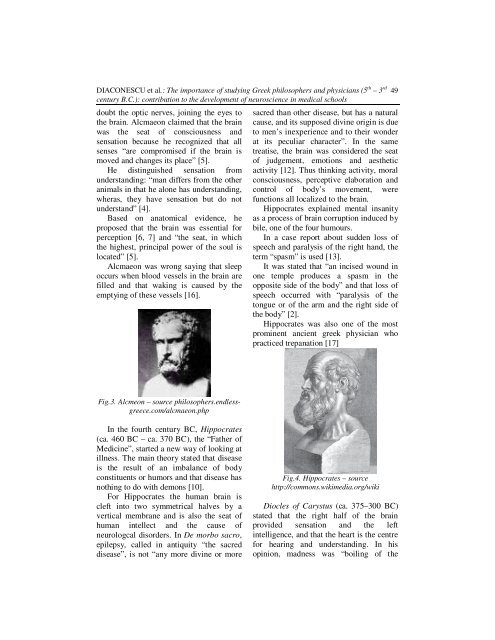Series VI: Medical Sciences – SUPPLEMENT ... - Krongres
Series VI: Medical Sciences – SUPPLEMENT ... - Krongres
Series VI: Medical Sciences – SUPPLEMENT ... - Krongres
You also want an ePaper? Increase the reach of your titles
YUMPU automatically turns print PDFs into web optimized ePapers that Google loves.
DIACONESCU et al.: The importance of studying Greek philosophers and physicians (5 th <strong>–</strong> 3 rd<br />
century B.C.): contribution to the development of neuroscience in medical schools<br />
doubt the optic nerves, joining the eyes to<br />
the brain. Alcmaeon claimed that the brain<br />
was the seat of consciousness and<br />
sensation because he recognized that all<br />
senses “are compromised if the brain is<br />
moved and changes its place” [5].<br />
He distinguished sensation from<br />
understanding: “man differs from the other<br />
animals in that he alone has understanding,<br />
wheras, they have sensation but do not<br />
understand” [4].<br />
Based on anatomical evidence, he<br />
proposed that the brain was essential for<br />
perception [6, 7] and “the seat, in which<br />
the highest, principal power of the soul is<br />
located” [5].<br />
Alcmaeon was wrong saying that sleep<br />
occurs when blood vessels in the brain are<br />
filled and that waking is caused by the<br />
emptying of these vessels [16].<br />
�<br />
Fig.3. Alcmeon <strong>–</strong> source philosophers.endlessgreece.com/alcmaeon.php<br />
In the fourth century BC, Hippocrates<br />
(ca. 460 BC <strong>–</strong> ca. 370 BC), the “Father of<br />
Medicine”, started a new way of looking at<br />
illness. The main theory stated that disease<br />
is the result of an imbalance of body<br />
constituents or humors and that disease has<br />
nothing to do with demons [10].<br />
For Hippocrates the human brain is<br />
cleft into two symmetrical halves by a<br />
vertical membrane and is also the seat of<br />
human intellect and the cause of<br />
neurologcal disorders. In De morbo sacro,<br />
epilepsy, called in antiquity “the sacred<br />
disease”, is not “any more divine or more<br />
49<br />
sacred than other disease, but has a natural<br />
cause, and its supposed divine origin is due<br />
to men’s inexperience and to their wonder<br />
at its peculiar character”. In the same<br />
treatise, the brain was considered the seat<br />
of judgement, emotions and aesthetic<br />
activity [12]. Thus thinking activity, moral<br />
consciousness, perceptive elaboration and<br />
control of body’s movement, were<br />
functions all localized to the brain.<br />
Hippocrates explained mental insanity<br />
as a process of brain corruption induced by<br />
bile, one of the four humours.<br />
In a case report about sudden loss of<br />
speech and paralysis of the right hand, the<br />
term “spasm” is used [13].<br />
It was stated that “an incised wound in<br />
one temple produces a spasm in the<br />
opposite side of the body” and that loss of<br />
speech occurred with “paralysis of the<br />
tongue or of the arm and the right side of<br />
the body” [2].<br />
Hippocrates was also one of the most<br />
prominent ancient greek physician who<br />
practiced trepanation [17]<br />
Fig.4. Hippocrates <strong>–</strong> source<br />
http://commons.wikimedia.org/wiki<br />
Diocles of Carystus (ca. 375<strong>–</strong>300 BC)<br />
stated that the right half of the brain<br />
provided sensation and the left<br />
intelligence, and that the heart is the centre<br />
for hearing and understanding. In his<br />
opinion, madness was “boiling of the


